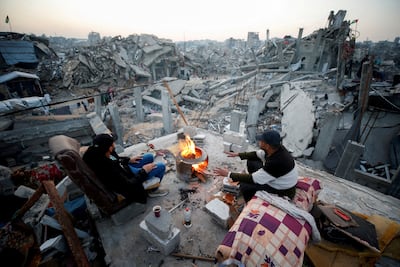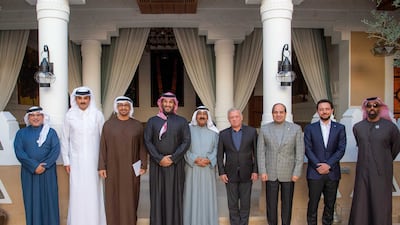Live updates: Follow the latest on Israel-Gaza
Leaders of Gulf Co-operation Council states and Egypt and Jordan met in Riyadh on Friday for informal talks that were expected to include discussions on a regional plan for post-war reconstruction in Gaza.
The meeting, convened by Saudi Crown Prince Mohammed bin Salman, was attended by UAE President Sheikh Mohamed, Qatari Emir Sheikh Tamim, Kuwaiti Emir Sheikh Meshal, Jordan's King Abdullah II and Crown Prince Hussein, Bahrain’s Crown Prince Salman bin Hamad and Egyptian President Abdel Fattah El Sisi. Sheikh Tahnoon bin Zayed, Deputy Ruler of Abu Dhabi and National Security Adviser, was also present.
Sheikh Mohamed said the meeting was ''part of efforts to further strengthen co-ordination and consultation between our countries'' and thanked Saudi Arabia for hosting it.
There was no statement issued following the talks, which served as a precursor to an emergency Arab League summit scheduled for March 4 in Cairo. Saudi Arabia said the meeting would be unofficial and held within “the framework of the close brotherly relations that bring together the leaders”, according to the Saudi state news agency SPA.
Sources briefed on preparations for the gathering told The National that the leaders would discuss a plan for Gaza's reconstruction drafted by Egyptian experts as an alternative to President Donald Trump's proposal that the US redevelop the Palestinian enclave as an international beach resort after resettling its inhabitants elsewhere.
The US President's plan has sparked regional condemnation and united Arab states in opposition, but disagreements remain over who should govern the war-ravaged Palestinian territory and how to fund its reconstruction.
The sources added that the Egyptian plan outlines the establishment of “safe zones” for Gaza’s residents, providing temporary housing in tents and caravans as they await the rebuilding of homes and infrastructure devastated by a 15-month Israeli military offensive against the Palestinian militant group Hamas.

The plan will be implemented over three to five years and will initially restore essential services such as health care and clean water, and revive the enclave's agricultural sector, they said. The reconstruction workforce would primarily be drawn from Gaza's residents.
Gaza is largely in ruins and the reconstruction of the Strip and the occupied West Bank will require at least $53 billion over the next 10 years, according to the latest Damage and Needs Assessment from the UN and partners.
A US State Department spokesman said on Thursday that Mr Trump had been expressing his view of “what the future for Gaza should be – not the same tired ideas of the past but something that’s bold and something that frankly took courage and vision in order to outline”.
“What cannot continue is the same cycle where we will repeat over and over again and wind up in the exact same place,” the spokesman said. “Related to that, the President has been very clear: Hamas cannot continue as a governing or militant force.”
Video - Middle East at a crossroads: Peace or Conflict?
Bernard Haykel, professor of Near Eastern Studies at Princeton University, said Mr Trump had “thrown down the gauntlet” with his “completely radical idea”.
“It's an effort to force the Arabs to try to come to a solution to this, to the Palestinian problem, that isn't just about … let's take irrevocable steps towards a Palestinian state, which is very vague,” Mr Haykel said. “They want a concrete Arab proposal for how to deal with Hamas … and how to rebuild Gaza and how to end the Arab-Israeli conflict and the Palestinian-Israeli conflict.”
With reporting from Willy Lowry in Washington

